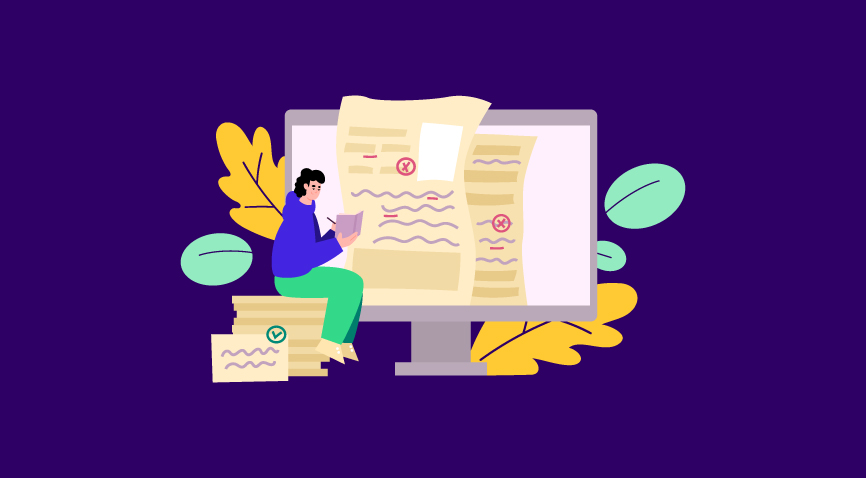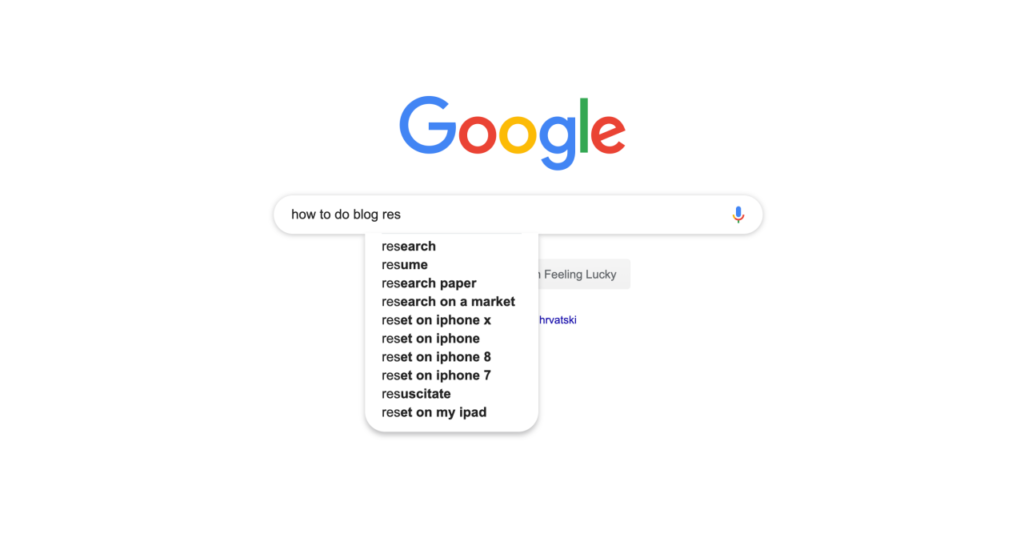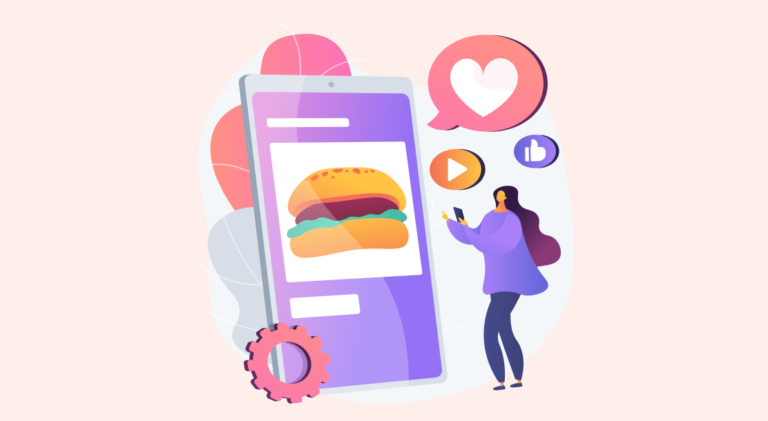

Over the years, the written word has evolved to be the most tangible form of expression and communication, from people writing on rocks to writing on paper and now hacking away at keyboards. The internet has employed several forms of written communication, one of which is blogs.
According to blogging wizard, around 70-80% of all internet users read blog posts, making it a dominant form of expression. If you’re looking to break into this wonderful space, or are a budding blogger, read on to check out many blogging mistakes examples and how to avoid them.
What Is a Blog?

The word ‘blog’ is in origin, a catchy abbreviation of the words ‘web log,’ which is an apt description of its essence. It is a log of thoughts, ideas, and information, published on a website.
Lightly put, if WhatsApp forwards were fact-checked, better-edited, and organized according to readers’ needs, you would get a blog. Jokes aside, blogs have a myriad of purposes ranging from individual expression to being sources of information to forming the foundations of advertising and marketing for large companies.
So, if you’re looking for home remedies for illnesses, excuses to get out of work, or ways to build a start-up, you’re almost certain to find blog content on it
9 Blogging Mistakes to Avoid
1. Not doing enough research
Research is an essential part of writing a blog post; not doing enough of it is one of the foremost blogging mistakes to avoid. Add facts and stats to enhance the credibility of your article.
According to a study, blogs are considered one of the most pertinent social mediums for communication. Therefore, it is fundamental that you cite reliable sources and make sure you add links to them. This will ensure that your readers are sufficiently backed up during their water-cooler debates.
That said, try refraining from plastering your blog with links and statistics because this distracts from the crux of the matter. There are no rules per se, but ensure that you only add relevant stats.

While this is one of the common blogging mistakes for beginners, it is easy to miss, especially when you write content for a lot of blogs.

2. Plagiarism
Plagiarism is one of the worst blogging mistakes in the online community. Firstly, this is a dangerous blogging mistake because you may face legal action due to plagiarism. Secondly, blogging is a competitive space, and making sure you stand out with creative, helpful content is what gives you an edge. Stats and figures are acceptable as long as you cite them.
It’s possible, on occasion, that your work bears similarities to existing articles without actually having copied it, so it’s best to put it through a plagiarism checker before publishing it.
3. Lack of personality
Speaking of making your work your own, another common mistake bloggers make is taking on a persona that does not match their personality. Your personality must shine through in your pieces of content. You don’t want the reader to feel as if they are reading an instructions manual.
Blogs are a creative space, so embrace your creative side. It makes the writing process enjoyable for you and the reading process enjoyable for your audience.
It is essential to understand the tone required of you as a writer. An article requiring a more formal tone, such as business blogging, would leave less space for expressing your personality than an informal one.
4. Being opinionated and over-expressive
As important as it is for your personality to shine through, a blogging mistake to avoid is making the article about yourself, unless your blog is about you. Otherwise, try not to dwell on your experiences or opinions too much and remain unbiased. In most cases, especially in the beginning, people will visit your page for information and not you.
You must never malign or defame any person or entity. Aside from landing you in hot water, it could make you less popular, result in trolling, and hurt your reader base.
5. Visually monotonous and unappealing content
A study revealed that 73% of blog readers tend to skim through content, only seeking out the most valuable points. To make it easier for them, add headings, sub-headings, and bulleted/numbered points as often as possible.
Insert relevant pictures to break the monotony of the text. Most importantly, do not repeat points, a mistake bloggers may make, or type unnecessarily long sentences to lengthen the word count. Try to remain concise.
6. Bad grammar

One of the worst blogging mistakes you can make is being grammatically incorrect. Even though the article may be informal in tone, ensuring it is grammatically correct is extremely important.
Aside from the fact that bad grammar and spelling will hurt the article’s credibility, it makes the content more difficult to follow. It’s best to use apps such as Grammarly that will help you eliminate these issues.
7. Not being relatable
A common mistake that bloggers make is making the content information-heavy instead of information-rich. While the difference between the two seems subtle, it makes a world of difference. The piece that you are writing must be as digestible for the target audience as possible.
Focus on the reader base
Before writing a blog post, make sure you understand who your primary reader is. For example, if you are writing about “10 Best Sports Shoe Brands”, and your readers are primarily Indians, a blogging mistake to avoid would be using references about how helpful it would be while playing baseball, which is mainly an American sport.
Be solution-oriented
You want your target audience to find real solutions which are not vague, conceptual, or impractical. Use examples to facilitate a better understanding of your point or solution.
Write content that’s easily understandable
Keep the vocabulary simple. Ensure that the reader doesn’t need to keep a dictionary by their side while reading the article.
8. Rushed writing
Remember that writing is a creative process, so don’t rush your articles and lose the creative spark. To avoid making this blogging mistake, plan your article well by having an outline before you start writing.
Almost all of the above points take a hit when you try to rush your work. If you face writer’s block, take short breaks to do routine chores or exercise. Review your article two to three times before publishing it. An editorial calendar can also help you manage your time and content better and help you avoid rushed writing.
9. Ignoring client background
If you are writing a blog post for a client, be it an individual, brand, or organization, make sure you understand their product or service, objectives, mission, and values. Once you have understood it, incorporate it into the article.
For example, if you have been employed to advertise a service offered by a non-profit organization, try to illuminate their charitable nature along with the service offered.
Ensuring that you avoid all these blogging mistakes can make you a phenomenal blogger attracting organic traffic. Don’t worry if it takes you a while to get used to it. Blogging is an art and takes some practice. Just remember to enjoy and explore yourself while you do it.
Some Other Common Blogging Mistakes
While the above points are some of the more common blogging mistakes to avoid, there are other things one should keep in mind when blogging.
1. Creating content for the heck of it
While there is nothing wrong with owning a niche and writing about it, not everything about it is “interesting.” A good way to avoid this blogging mistake is knowing if the juice is not worth the squeeze, no matter how good some ideas sound.
There is a certain value in focusing on what your reader needs and wants. Take McDonald’s, for example. While they were known for their hamburgers in the US, in India, they only struck gold when they launched veggie and chicken burgers.
This is one of their ads for the US market; no matter how good it is, do you think this would work with Indian customers?

2. Not repurposing content
Let’s assume you have a 100 subscribers and you post three times a week. Do you think all your subscribers read all of your blogs? Wouldn’t you think it makes sense to repurpose your content and showcase it multiple times on your blog?
Like the last blogging mistake dealt with using the wrong ideas, this one deals with not pushing your idea enough. If you have a great idea and received excellent reviews, reuse it. Think of it this way – who wouldn’t want another spider-man movie?

3. Titles trouble
Your title is like an elevator pitch; it has to sell, inform, and capture the audience’s interest, if not evoke an emotional reaction. This is one of the mistakes bloggers often make.

Choosing the right titles is an art you need to learn to master as early in your blogging career as possible.
4. Not being consistent
When you post consistently, your readership grows, your subscribers start looking forward to your email marketing, and you build a relationship with your audience. When you don’t, initially they worry, then they forget. And once they have crossed that line, getting them back becomes tougher than acquiring new customers. Letting the spark fade is a big blogging mistake to avoid.

Tips and Tricks to Avoiding Mistakes Bloggers Make
Now that you have a huge list of blogging mistakes bloggers make let’s look at some tips and tricks to effective blogging.
1. Have a strategy for every blog post
Some blog posts are about getting new customers interested and aware of your blog. For example, you are a blogger who writes for GenZ and has reviewed the new feature for an iPhone.
On the other hand, some blogs are for engaging with your older readers and building a long-term connection. For example, if you own a gardening blog and write content about managing orchids as a follow-up to a previous post on how to sow orchids.
2. Identify what your customers like and how

Seek feedback, and ask them what works and what doesn’t. Review your posts, and find out which posts received the most interactions and which posts, in general, have a better following.
Sometimes you can even find small details like how much imagery they like with their content, and what kind of content they are looking for – explanatory, informal, etc. Figure out the different customer personas of the people reading your blogs and cater to all of them.
3. Write how you talk
Don’t try to be someone else when you write. In the long run, this blogging mistake may hurt your readership. Instead, write how you talk.
While most people will not read your whole blog, keeping it easy to read and a tad funny with tons of personality could keep them hooked. A blog is like a discussion between friends, not a speech by a president. The more effortless your writing is, the easier readers will find it to stay hooked.
4. Build an emotional connect
Humans are a sucker for emotion; if you can get them excited, happy, sad, or even angry, they will hear you out; so try to build a connection and evoke an emotional response as often. But remember, don’t try too hard, else it won’t come across as genuine.
5. Summarize, summarize, summarize
Three is gold when it comes to making your reader remember something. Tell them what you will tell them before starting, tell them what you are telling them while you are, and then remind them what they now know after reading through your blog.
The only way to ensure your point reaches them is to say it repeatedly. Avoid digressing, keep it to the point, and come back to it, but keep it all interesting. Think of it like a walk in the park; you will always have to return to where you start.
6. Make choosing posts and writing titles an art
The shorter and the more relevant you keep them, the better. Did you know the Apple iPhone started as a niche product? It evolved so well that it became a status symbol over time. Let that be your start.
Avoid the blogging mistake of trying to engage everyone instead, choose smaller topics more relevant to your audience and ace them. Your blog does not need to be read by a million people; even a thousand people reading most of your blogs would do the trick. It’s easier to get a thousand people to hang on to every word you write than write content that impress a million people.
7. Understand the bigger picture
This is probably easier said than done, but once you understand the buyer persona, you also need to understand the bigger picture. Look at your product or service from your audience’s point of view – what do they need that you may have missed?
When you step into your reader’s shoes, you realize what you are missing. Only then can you complete the puzzle. Once you have the bigger picture in mind, you can better assist your customers and attract more organic traffic.
8. Index
Index is your biggest weapon to stay relevant to all your user personas. Give them one they can scroll on and find what they are interested in. This way, you save them time and give them exactly what they need. They never hesitate to come because they know finding what they need on your blog is going to be quick and painless.
In content marketing terms, this is one of the things that increases the lifetime value of your customer. Structure your blog with an outline, clear craft headers, into different sub-topics, and have an easy search bar to help them find what they need.
What Does Starting a Blog Mean?
Now that we have shared a few tips and tricks from the business, let’s delve a little bit deeper into what you need to know before starting a blog.
1. Blogging is a ton of effort
Writing is just the beginning. Unless you are writing solely for yourself, you need to understand your readers and help them understand how you add value to them. While you are doing this, through SEO and proper keyword research, you also need to inform search engines of your intentions. Every now and then, you can also take advantage of paid advertisements, however, don’t make a habit out of it.
2. Blogging for money isn’t as quick and painless as it sounds
While you may have read that many people make money online through blogs, blogging is a long-term project.
Sure, you could make millions; but that happens after making a consistent effort for at least a couple of years. And you still may not if you don’t get your basics straight.
3. Blogging means going social
As a blogger, you will need to interact and connect with other bloggers within and outside your niche. This is a great way to expand your network and reach a wider audience. Bloggers tend to form a close well-knit community that frequently helps each other, so get involved. Help and be helped.
Key Takeaways
- Know your customer and segment into customer personas
- Give your blog a personality
- Cater to the larger picture for all your consumer personas
- Post strategically and consistently
- Write comprehensive articles that are not only easy to read but also have great outlines and headings
- Make your content stand out and engaging – add pictures, infographics, and back it up with data
- Focus on researching well and hyperlink to other blogs to build credibility
- Blogging is a lot of effort – know what you are getting into and have a niche
Conclusion
Ensure you’re avoiding these blogging mistakes in your blogging journey. The tips we have highlighted will help you build great customer relationships and grow in your journey to being a successful blogger.
Building a blogging community takes time, but it happens as long as you get your basics right. While there are millions of websites online, there are also millions of visitors looking for all kinds of content, whether it be educational content like learning digital marketing online, how to use guides for common products, or even just simple information on best practices in a particular industry.
Last, but probably the most important – remember your customer and cater to them. Know what adds value to them, and they will add value to you.
FAQs
Some of the basic blogging mistakes are –
Not blogging consistently
Not creating content relevant to your audience
Lack of personality
Not backing up your data with facts and links
One of the most common blogging mistakes for beginners is not defining your audience. While many bloggers forget to define an audience before starting, some bloggers define an audience that is too wide and, hence, low on loyalty and relevance. The rest define an audience that is too niche and does not suit their writing style/experience.
Some of the biggest blunders to avoid in blogging are choosing the wrong topics, not having user-focused or comprehensive content, not linking to other content, and not having a call to action promoting further engagement.
In a strict business sense, traffic is about money. Bloggers who blog more for fun than the business can choose to write about anything.
While blogging isn’t all that difficult and most bloggers can get started with blogging in a couple of hours, using relevant keywords, finding and holding an audience’s interest, and ranking higher on search engines does take getting used to.
Latest Blogs
Explore how Google’s 2025 AI search updates triggered ranking chaos. Learn actionable strategies to adapt your SEO for AI Overviews, zero-click searches, and SERP volatility. Stay ahead now.
Learn how to rank on AI search engines like ChatGPT, Perplexity, and Gemini by optimizing your content for authority, structure, and relevance. Stay ahead in AI-driven search with this strategic guide.
Explore the best healthcare SEO services for your medical practice. Improve online visibility and effectively reach more patients in need of your services.
Get your hands on the latest news!
Similar Posts

Content Analytics
8 mins read
Google I/O 2025: AI Search Shake-Up & Ranking Volatility

Artificial Intelligence
5 mins read
Top AI Blog Writing Tools for Website Monetization

Blogging
10 mins read